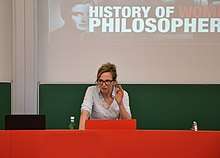Ruth Hagengruber
Ruth Hagengruber is a German philosopher, currently professor and head of philosophy at the University of Paderborn.
Ruth Hagengruber | |
|---|---|
 | |
| Nationality | Germany |
| Education | Ludwig Maximilian University of Munich |
| Employer | University of Paderborn |
Life
Hagengruber was born in Regen. She earned her PhD in philosophy from Ludwig Maximilian University of Munich and taught at the philosophy department at the University of Koblenz and Landau and the University of Cologne before coming to Paderborn to be professor and head of philosophy. She is director of the research areas History of Women Philosophers and Scientists[1] and EcoTechGender on the social and ethical implications of artificial intelligence[2].
The "History of Women Philosophers and Scientists" aims at renewing the tradition of women philosophers. In this capacity, the Elisabeth of Bohemia Prize is awarded for the recognition of women in the history of philosophy since 2018[3].
In April 2015 the first Master Erasmus Joint Programme dedicated to the Study of the History of Women Philosophers was established in cooperation between the University of Paderborn and Yeditepe University in Istanbul.
Works
Hagengruber has edited various books on the history of women philosophers
- (cf. 2015 The MONIST 98/1 ed. Barry Smith; Advisory Editors: Karen Green & Ruth Hagengruber:
- THE HISTORY OF WOMEN’S IDEAS, Oxford University Press).
Hagengruber's research focuses on the philosopher Emilie du Châtelet.[4] In 2006 she founded the Teaching and Research Area: EcoTechGender[5]
Hagengruber defines economics, technology and gender as the challenging and decisive factors of the future. "EcoTechGender" at the University of Paderborn is dedicated to the philosophical analysis of the relation between these topics.
Hagengruber is an honorary member of the International Association for Computing and Philosophy (IACAP) and member of the Advisory Board of the Munich Center for Technology in Society (MCTS) at the Technische Universität München.
In 2016 Hagegengruber gave one of two keynote speeches at the 16th Symposium of the International Association of Women Philosophers in Australia. [6]
Publications
- Hagengruber, Ruth, Riss, Uwe. (Eds.). 2014. Philosophy, Computing and Information Science. London: Pickering & Chatto;
- Hagengruber, Ruth, Ess, Charles. (Eds.). 2011. The Computational Turn: Past, Presents, Futures? Münster: MV-Wissenschaft;
- Hagengruber, Ruth, 2000. Nutzen und Allgemeinheit. Zu einigen grundlegenden Prinzipien der Praktischen Philosophie. Sankt Augustin: Academia.
Teaching and Research Areas
History of Women Philosophers and Scientists
The Teaching and Research Area "History of Women Philosophers" headed by Hagengruber aims at renewing the long-lasting tradition of women philosophers. Ruth Hagengruber started her lecture "2600 Years History of Women Philosophers" in 2011.
Philosophy in the Media
With the project “Philosophy in the Media“ the philosophy in Paderborn breaks new grounds. It was launched by Hagengruber (philosophy), Gerhard E. Ortner (dramatic staging), Ulrich Lettermann (music), and Bernhard Koch (filming) to present women philosophers’ thoughts via student performances to the wider public. These performances feature women philosophers and scientists including Emilie du Châtelet (1706-1749), Ada Lovelace and Elizabeth of Bohemia (1618-1680). The past event “Philosophy On Stage” focused on Elizabeth of Bohemia’s influence on René Descartes. In December 2014, the project won the Advancement Award for Innovation and Quality in Teaching 2014 of the University of Paderborn.
Bibliography
- Hagengruber, Ruth and Green, Karen. 2015. The History of Women's Ideas. The Monist 98. Oxford: Oxford University Press.
- Hagengruber, Ruth, Riss, Uwe. (Eds.). 2014. Philosophy, Computing and Information Science. London: Pickering & Chatto.
- Hagengruber, Ruth / Ess, Charles. (Hg.). 2011. The Computational Turn: Past, Presents, Futures? Münster: MV-Wissenschaft.
- Hagengruber, Ruth (Hg.). 2011. Emilie du Châtelet between Leibniz and Newton. New York u.a.: Springer.
- Hagengruber, Ruth / Rodrigues, Ana. (Hg.). 2010. Von Diana zu Minerva. Philosophierende Aristokratinnen des 17. und 18. Jahrhunderts. Berlin: Akademie-Verlag.
- Hagengruber, Ruth (Hg.). 2002. Philosophie und Wissenschaft – Philosophy and Science. Tagungsakten zum 70. Geburtstag von Wolfgang H. Müller. Würzburg: Königshausen & Neumann.
- Hagengruber, Ruth. 2000. Nutzen und Allgemeinheit. Zu einigen grundlegenden Prinzipien der Praktischen Philosophie. Sankt Augustin: Academia Verlag. (Habilitationsschrift)
- Hagengruber, Ruth (Hg.). 21999 [11998]. Klassische philosophische Texte von Frauen. Texte vom 14. bis zum 20. Jahrhundert. München: dtv.
- Hagengruber, Ruth / Stein, Otti / Wedig, Sigrid (Hgg.). 1996. Begegnungen mit Philosophinnen. Koblenz: Quast Verlag.
- Hagengruber, Ruth. 1994. Tommaso Campanella. Eine Philosophie der Ähnlichkeit. Sankt Augustin: Academia Verlag. (Dissertation)
- Hagengruber, Ruth (Hg.). 1980. Inseln im Ich. München: Matthes & Seitz.
External links
- Homepage University of Paderborn, CV
- Research Area EcoTechGender
- Research Area History of Women Philosophers
- Who-is-Who at the University Paderborn, Page 30
- Professors at the University of Paderborn, Portrait
- Publications
- Publikationen: History of Women Philosophers and Scientists
- Lecture Liberlaism Gummersbach 2012
References
- History of Women Philosophers and Scientists, upb.de
- Forschung, Bundesministerium für Bildung und. "Mensch, Maschine, Muße: Über Arbeit im digitalen Zeitalter". www.wissenschaftsjahr.de (in German). Retrieved 2019-09-16.
- "Erster Preis zu Ehren einer Philosophin: Prof. Dr. Ulrike Detmers stiftet Philosophinnen-Preis zum 400. Geburtstag von Elisabeth von Böhmen Herford an das Center for the History of Women Philosophers and Scientists der Universität Paderborn| DAB e.V." www.dab-ev.org. Retrieved 2019-09-16.
- Ruth Hagengruber (29 October 2011). Emilie du Châtelet between Leibniz and Newton. Springer Science & Business Media. pp. 227–. ISBN 978-94-007-2093-0.
- EcoTechGender, paderborn.de.
- Thanks for funding, Monash.edu.au, Retrieved 18 August 2016